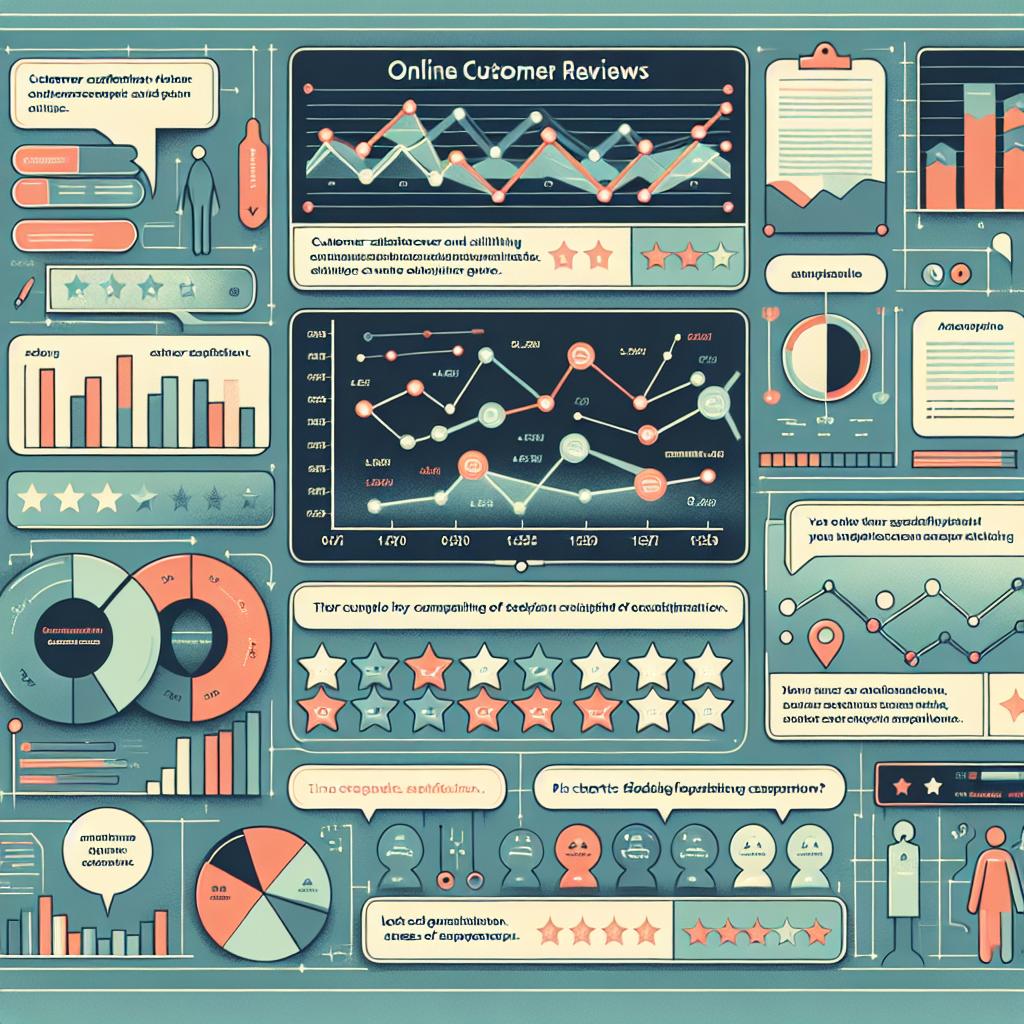
Develop a proactive strategy for negative reviews
Understanding the importance of negative reviews and their proactive management
Negative reviews play a vital role in how consumers perceive a business. While often dreaded, they represent a valuable opportunity for continuous learning and improvement. When handled appropriately, these reviews can bolster a business's growth and demonstrate a commitment to customer satisfaction .

The two-sided nature of reviews: an opportunity for growth
Negative online reviews may seem unsettling at first. However, they provide essential direct feedback to identify potential weaknesses in the business. For example, a review complaining about long delivery times may prompt a review of logistics processes.
Furthermore, it's crucial to recognize the impact negative reviews have on a brand's reputation. According to some studies, 49% of consumers trust these reviews as much as personal recommendations. Poor management can therefore tarnish a brand's image and deter potential future customers.
- Reputation : Reviews influence customers' perception of and trust in your business.
- SEO : Ignoring negative reviews can impact your online ranking.
- Loyalty : Poor management can weaken customer loyalty and encourage them to leave for the competition.
Analyzing these negative reviews in a proactive and calm manner not only helps resolve dissatisfaction, but also demonstrates authenticity that will help strengthen the company's credibility with consumers.
Responding with strategy: an imperative for businesses
Responding to negative reviews requires a thoughtful, strategic approach, starting with the effort not to take them personally. Responding with a professional and empathetic tone often helps defuse tensions. Additionally, addressing complaints quickly demonstrates that you take your customers' concerns seriously.
Using reviews as a lever for improvement and encouraging private discussions with affected customers can turn a negative experience into a positive opportunity. Figures show that a company that listens to customer feedback enjoys a better image.
Maintaining an open and constructive dialogue through personalized responses to every review, even negative ones, can strengthen public sympathy for your brand. Proper management also demonstrates your commitment to consistently providing quality products and services.
The overall impact of reviews: a key issue
With the advent of platforms like Google , the power of consumer reviews has increased dramatically. In fact, 88% of consumers are more likely to choose a responsive business. Ignoring negative reviews is a major risk for any business.
Reviews help improve customer service by uncovering issues that often went unspoken in the past. Rather than viewing criticism as a threat, use it as a catalyst for improvement and demonstrate your commitment to continually improving the user experience.
Every strategically addressed review helps strengthen your brand's perceived transparency and integrity. By demonstrating that you're attentive and focused on continuous improvement, you transform your public image and foster customer loyalty.
Strategic Responses to Negative Reviews: Speed and Personalization
Responding quickly and personally to negative reviews is central to an effective customer feedback management strategy. When criticisms arise, they must be addressed immediately to prevent the frustration of dissatisfied customers from building up.
Responsiveness: the key to success
Being responsive to a negative review is essential for defusing tensions. On social media , a dissatisfied customer often expects a response within an hour. This speed demonstrates that the company takes their concerns seriously.
Identifying the problem quickly not only helps find a solution, but also highlights areas requiring internal improvements. This proactive approach projects a positive image of the company, illustrating its commitment to customer service and satisfaction.
Respond courteously, offer a sincere apology, and acknowledge your mistakes without arguing. A exemplary attitude inspires trust and reassures customers of your brand's responsiveness and reliability.
To personalize your responses, include details related to the customer's feedback and tailor the message to each specific situation. This demonstrates that each review is taken seriously and addressed individually.
Designing the ideal response: concrete structure
A well-structured response begins by acknowledging the criticism and accepting the customer's experience. Then, offer a sincere apology without minimizing the incidents discussed. Each response should include concrete solutions or suggestions for improvement.
For example, in the hotel industry, a complaint about cleanliness may lead to the offer of a thorough investigation and compensation, such as a free night as a gesture of goodwill. In the restaurant industry , acknowledging slow service and inviting the customer back for a better experience can restore trust.
Choose words that reflect professionalism, expertise, and empathy. Personalizing your responses, such as by mentioning the customer's first name or detailing their grievances, will reinforce the authenticity of your approach.
Finally, offer a method of contact to continue the discussion privately. This approach not only demonstrates your willingness to actively resolve the issue, but also helps avoid unnecessary public escalation.
Concrete examples and real actions
Let's say a customer criticizes a dish at a restaurant. A meaningful response might include an apology for their disappointment, followed by an invitation to return for another taste, demonstrating appreciation for their feedback.
In the hotel sector, when faced with a complaint about noise pollution, it would be appropriate to remind the client of internal measures regarding acoustic comfort, to offer another room and compensation, such as a free night or a drink at the hotel bar.
These examples illustrate how to turn a negative review into an opportunity to demonstrate a company's commitment to customer satisfaction. This strengthens customer loyalty by showing them that their feedback is truly valued.
By adopting this proactive approach, a company positions itself as responsive, focused on constant improvement, and thus promotes the building of a loyal and satisfied customer base.
Influence of negative reviews on online reputation
How a business handles negative reviews can have a decisive impact on its online reputation. By responding appropriately, a company can both strengthen its credibility and cultivate a positive brand image.

Building Credibility: Some Key Principles
One of the fundamental elements of building a strong brand image is engaging in sincere dialogue with dissatisfied customers. By addressing criticism calmly and professionally, you demonstrate that your company is attentive and committed to improving.
- Transparency : Responding to online reviews shows that your business is honest and trustworthy.
- Empathy : By expressing empathy, you show that you understand and care about your customers' experiences.
- Sincerity : A genuine apology highlights the humanity behind your brand.
- Solutions : Provide practical and concrete answers to customer complaints.
By adopting these principles, you not only strengthen the credibility of your business, but you also demonstrate your willingness to evolve and ensure customer satisfaction .
This approach promotes a positive and authentic public image, which reassures your current customers while attracting future prospects.
Successful Business Cases
Many businesses have successfully turned criticism into real growth opportunities. For example, one hotel facing frequent comments about outdated facilities responded transparently by sharing planned renovations, demonstrating its commitment to guest comfort.
These steps demonstrate the importance of giving genuine consideration to negative feedback and demonstrating that you are committed to providing quality service over the long term.
Analyzing these examples can help your business learn valuable lessons and adapt these practices to your own strategy.
Elements not to be neglected for success
To maximize the benefits of negative feedback on your brand image , it is crucial to maintain a consistent tone in all your communications.
Each answer should reflect your company's values and culture, highlighting a genuine commitment to continuous improvement.
Well-thought-out communication allows your company to project an image of resilience and build trust. By being transparent and open to criticism, you position yourself as a credible and reliable player in your industry.
These practices not only help calm criticism, but they also help you anticipate your customers' expectations and turn every feedback into an opportunity for growth and excellence.
Turning negative reviews into opportunities for improvement
Negative reviews aren't just obstacles, they're also valuable starting points for identifying areas for improvement . Rather than dreading them, consider them as valuable levers to better meet your customers' expectations.
Removing the obstacles to continuous improvement
Actively listening to your customers is essential to establishing a continuous improvement process . By identifying trends and spotting recurring problems, you will be able to effectively adjust your offering or services.
Areas of friction or dissatisfaction in the customer experience are an ideal starting point for change. A thorough analysis of this negative feedback allows you to validate and refine your operational strategies.
Empathetic responses, combined with immediate and thoughtful actions, can encourage customers to reconsider their criticisms. This approach helps strengthen their loyalty and build trust.
This type of commitment, particularly appreciated in sectors such as retail or catering, clearly demonstrates your desire to progress and respond positively to customer feedback.
Turning Criticism into Customer Loyalty
While receiving criticism can be difficult, knowing how to turn it into concrete action can attract premium customers . For example, revising one of your policies after a comment can lead to improvements that can build long-term customer loyalty.
Recognizing the value of these insights is crucial. They not only help prevent the loss of future customers, but also create growth opportunities .
Examples abound of companies that have successfully transformed dissatisfied customers into true ambassadors through skillful feedback management. This method illustrates the importance of constructive dialogue and authentic communication in enriching your brand image.
Practical cases and response strategy
Many industries use lessons learned from negative feedback to improve their performance. For example, an automotive company might review prices deemed too high by customers and adjust additional services accordingly.
In retail, criticism of service or product quality often prompts rethinking areas for improvement. Strategies implemented in these cases result in a better customer experience.
In the hotel industry, issues related to room cleanliness or a lack of amenities can lead to adjustments that will significantly improve guest satisfaction.
These initiatives, carried out by different sectors, show how criticism can serve to solidify the relationship between the company and its customers while ensuring continuous and qualitative development.
Adapt your strategy according to the sector to manage negative reviews
Managing negative reviews must take into account the specificities of each industry. Take a tailored approach to your responses to maximize impact, keeping in mind that each industry has its own audiences and distinct priorities.
Catering: Take every food critic into account
In the restaurant industry, responding to complaints about service times or food quality is essential. Provide appropriate responses and encourage your customers to return to see the improvements. This is a perfect opportunity to regain their trust!
Facility managers should review their internal processes and provide personalized training to their teams to ensure professional and responsive service.
Offering incentives , such as a new tasting, clearly demonstrates your commitment to customer satisfaction and strengthens trust. It also helps build customer loyalty in a competitive market.
By investing in the quality of the customer experience, you guarantee a top position in their minds and good resistance against the competition.
Hospitality: Managing Expectations and Realities
In the hospitality industry, reviews can be about comfort or the quality of services offered. If a cleanliness issue is raised, it is crucial to intervene quickly to remedy the situation.
For example, suggest a room change or implement immediate corrective measures to meet the guest's expressed expectations. Offering quick solutions significantly improves their perception.
Develop proactive listening skills to understand your visitors' needs and ensure each complaint is addressed carefully. This approach promotes satisfaction and long-term loyalty.
Your ultimate goal is to create a positive and memorable memory, one that will stay with your customers even after they leave.
Retail: Transforming Shopping Experiences
In the retail industry, knowing how to properly address product or service expectations is paramount. Make sure your staff are easily accessible and ready to answer questions clearly and courteously.
Excellent customer service also relies on returns and exchanges being handled quickly and efficiently, to resolve any dissatisfaction promptly.
Smart businesses focus on their customers' concerns, turning every interaction into an opportunity to demonstrate their commitment to quality. This can not only encourage customers to return but also strengthen their loyalty.
Active listening combined with a constant focus on quality helps build a strong professional image and stimulate the growth of your business.
Developing a comprehensive strategy to manage interactions around negative reviews
Implementing a comprehensive strategy for managing negative reviews is essential to ensuring clear and constructive discussions. This structured approach not only aligns each response with your brand values , but also maximizes opportunities for continuous improvement.
Pillar of a global strategy: Vision and actions
An effective strategy begins with a thorough understanding of the different types of criticism, combined with the establishment of a system capable of identifying and addressing them quickly.
- Identification : Quickly detect negative reviews and classify them according to their impact.
- Responsiveness : Provide a rapid response, ideally within 48 hours .
- Empathy : Respond with empathy to acknowledge and respect the perspective of dissatisfied customers.
- Concrete solutions : Propose tangible solutions that demonstrate real management of the situation.
These measures ensure optimal management while contributing to a sustainable improvement in the customer experience. By combining speed and understanding, you demonstrate your commitment to customer satisfaction .
The ultimate goal is to turn every review into an opportunity to strengthen your brand image and build strong, lasting relationships with your customers.
Internal coordination and impact of training
A key element of this approach is collaboration between different teams within the company. Ongoing staff training in review management ensures professional responses that align with the organization's core values .
Actively involving each employee in this strategy helps create a collective dynamic where everyone contributes to improving customer relations.
Emphasize to your teams the benefits of negative reviews, emphasizing the importance of respectful and patient interactions to strengthen a quality customer relationship .

